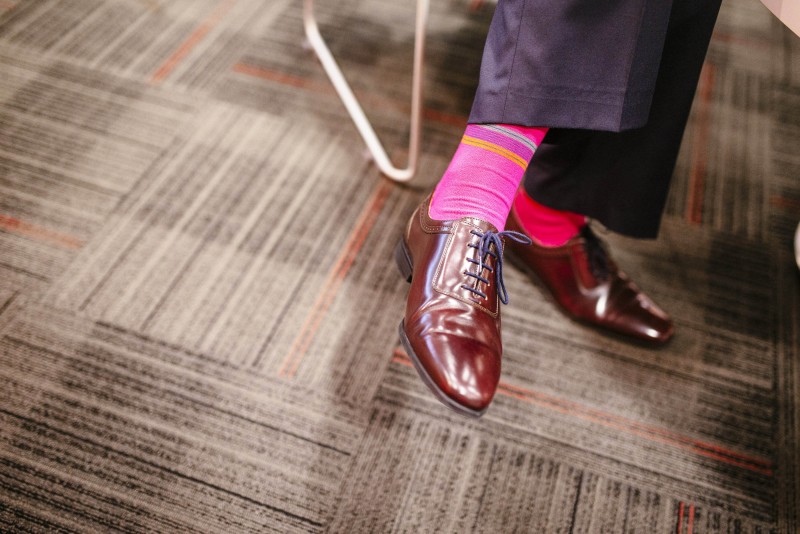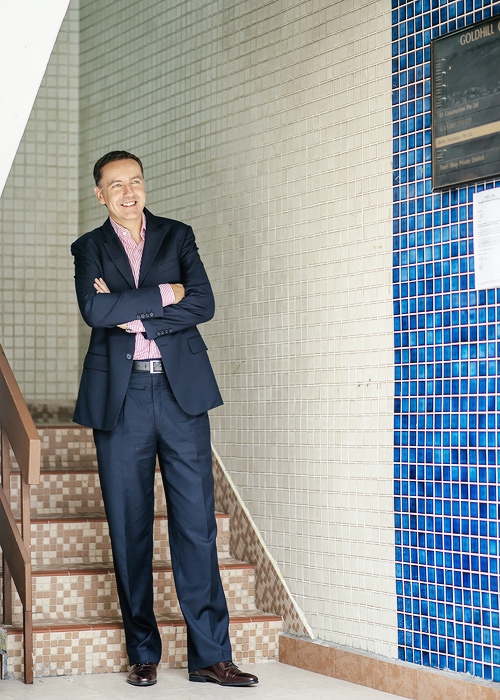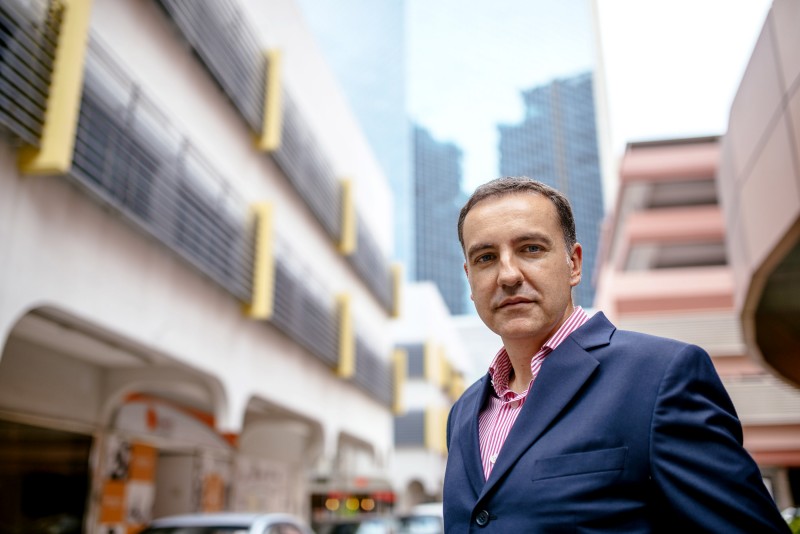Steve Melhuish is wearing pink socks. “I have red on my phone and shirt because I had a client meeting before this; I don’t have red socks, so this is close enough,” he tells me. I’m sure his shirt is pink, not red. Short of asking if he’s colour-blind (or maybe I’m), I wonder if his choice of sartorial hues is due to the customary Chinese colour for good luck, or his brand. But it wasn’t so much luck that got him to where he is, it was gruelling hard work, too, and a large dose of risk-taking.
The native Londoner was already running a division of a Telco with S$500 million in annual turnover, but he got bored. His bedroom wall offered a clue – “Asia. Digital. Start-up.” The poster exclaimed. “I wanted to build something. My previous life, even though I loved what I did, was not about pioneering something,” he recounts as we sit in his training room, also in bright red, of course. I’m glad they got this colour right.
The promise of the ‘Asian Dream’ had lured many to this part of the world in search of new opportunities. Steve was frequently flying to Shanghai interviewing for digital opportunities, and then spent six months travel-hopping around South East Asia with his wife in search of a new home. The odyssey took the couple to Myanmar, Laos, Cambodia, and Vietnam. Finally, a re-organisation at his wife’s company resulted in them arriving in Singapore.
Fast forward 8 years, Steve runs one of the most recognisable and successful websites in Singapore and the region. Despite this considerable success, you sense not a whiff of complacency in him. He even says he is “a bit of a softie”, which I doubt – he recently did a fire walk.
Conversations with Steve Melhuish
YONG HUI YOW: What happened when you arrived?
STEVE MELHUISH: I ran around talking to universities, start-up entrepreneurs, attending talks and classes. There wasn’t very much here back then, but the government’s done an amazing job getting the ecosystem moving since then. Subsequently, I ran into this mobile start-up, where I spent time working at.
YONG HUI: What happened to it?
STEVE: I was asked to help out increasingly more, until I was approached to run it. But the investors and founders fell out. They were constantly fighting. Then the founders left, so there wasn’t much of anything left.
YONG HUI: How did you get the idea for PropertyGuru?
STEVE: In 2006, the property market went absolutely crazy with the enbloc fever – there was S$13 billion in enbloc sales. The population was growing very fast, from 4.5 to 5.4 million. Then, I had been in Singapore for about 2 years, and was renting a property at ‘Emerald Mansions’, which went ‘enbloc’ too, so my wife and I had to look for a new place. The first thing we did was to go online. At that time, everything was moving online globally – banking, travel, property, and I found nothing for property in Singapore – that really surprised me.
YONG HUI: How hard was it to find properties?
STEVE: It was massively frustrating. I had 2 choices – buy the classifieds, and wade through these horrendous 30 pages of 3-line texts. I had no idea what the property looked like – no photos, no floor plans, sometimes no prices, and tiny descriptions. People likely spend their biggest sums of money on a house, so it was scary as hell. The alternative was an agent – there are good agents, and bad agents. They’d show you what they have; but in general, you weren’t getting a true view of the total market. So I did my research, and found that property portal market leaders in Australia, France, China, and the UK, were very successful, profitable, billion-dollar market capitalisation companies. It seemed like a great opportunity, and Singapore had the infrastructure.
YONG HUI: How did you come up with the name?
STEVE: I originally came up with ‘StraitsHomes’. [laughs] Then, we came up with 24 names, and did a survey of our friends and family. ‘PropertyGuru’ was the clear winner. Initially, I was a bit apprehensive because when I asked some guys in Chinatown about ‘PropertyGuru’, they said it sounded ‘Indian’, and won’t use it, but we stuck with it. Well, didn’t turn out so bad after all.
YONG HUI: How did you make the jump to full-time?
STEVE: My co-founder, Jani, was working in India 5 days a week, and would come back to Singapore on the weekends; I was still working on the mobile start-up most of the time. So we could only work on PropertyGuru on the weekends. We kept doing this until mid-2007 when we said ‘let’s go for it’. We had a common vision, market opportunity, and wanted to build something that addressed that.
YONG HUI: What were the initial stages like?
STEVE: The initial team was just Jani and I. Later, 3 others joined. We were in a tiny shop house on the top floor in Chinatown. We launched in Dec 2007, and 3 months before that, SPH launched ST701, Mediacorp launched Mocca, and there was iProperty – it was a bit scary. We worked 24 hours a day, 7 days a week for the first 2 or 3 years. We didn’t take a salary for the first 2 years because all the money went back into the business and employees – it was very tough.
YONG HUI: How did you get traction?
STEVE: Initially, we took newspaper listings and brought them online, which confused some agents who called to say, ‘‘what is this PropertyGuru thing’. Shortly, we started to have discussions around PropertyGuru as an advertising platform for agents to self-manage listings. Our prices were very cheap – from 50 dollars per annum in those days. We got a thousand paying agents by the end of the first year, 4,000 by the second, then 10,000, now we have 30,000 paying agents. We also gave agents free personal websites, which was a new thing back then. We took photographs of every single condo, flat and commercial building – we built our database from scratch. By 2009-10, we had built a very strong leadership position. We raised some money at the end of 2008 to hire a few more staff, and also to advertise online, and on taxis, which was a strange thing to do at that time, but it helped us get some awareness.
YONG HUI: What made PropertyGuru stand out from that competition?
STEVE: As founders of the business, we care passionately about it. It’s our livelihood, single biggest asset we’ve got. It’s our baby and a part of our families for the last 7 and a half years. You don’t really start caring for a business unless it’s your own. There’s a huge difference between being a founder, and being an employee. In competing with SPH and Mediacorp, this made a key difference. We continue to invest heavily in PropertyGuru; we spend millions in marketing, content, and in building a great product.
I’m super grateful and blessed that from this, came not just a fabulous business and team, but also two lovely kids.
YONG HUI: How did building PropertyGuru affect your personal life?
STEVE: The first 5 years were incredibly challenging. My wife and I didn’t go on a holiday between 2008 and 2012. Then, my mother passed away. My wife and I were also trying to have kids – unfortunately, that couldn’t happen, so we went through 6 rounds of fertility treatments, which was very stressful for us emotionally, mentally, physically, and also financially. Bear in mind, we were investing all our life savings into PropertyGuru, and in having kids. I’m super grateful and blessed that from this, came not just a fabulous business and team, but also two lovely kids. My wife supported me through essentially what was a gruelling process of building a start-up.
YONG HUI: How different was starting PropertyGuru from your previous career?
STEVE: I learned more in these 7 years than I have done in the previous 17 years of my career, and I continue to learn every single day. The day you stop learning, is the day you start dying. Building and running your own business is completely different from most other things. I previously ran a S$500 million turnover business in the UK – that was easy as compared to running a S$5 million business from scratch – it’s a completely different set of complexities.
YONG HUI: What have you learned from hiring?
STEVE: Hiring is the single biggest issue for every founder, start-up, SME, and multi-national, as finding and retaining talent is really tough. In 2011, we went from one country to 4 countries in four months, and had to hire 200 people very quickly. The challenge was to hire 200 people in such a short space of time, you sacrifice quality for quantity. Of the 200 we hired, within 12 months, 10 to 20 per cent had left. The flipside is removing people from the company, which is always a painful process I struggle with because I’m a bit of a softie. And I’m particularly sensitive to the good guys. If you start to remove people, I thought the good guys would get upset. I found the converse true instead; the good guys got upset when you have bad guys around.
YONG HUI: What kind of culture did you want for PG?
STEVE: If you walk down our corridors, you’ll see our values on the walls. “GURUS” represents ‘Groundbreaking’: being innovative; ‘Urgency’: we are in a digital, start-up environment, so you got to be fast; ‘Results’: do quality work; ‘United’: teamwork, and ‘Service’: great customer service. These drive our culture, which is one of fun, openness, and respect.
YONG HUI: How different do people search for properties in Singapore as compared to other countries?
STEVE: Every market is different. In Singapore, many people are looking to upgrade or to buy their first condo for instance. Typically, they would search for a particular condo name, whereas in Malaysia, you have a lot more landed property, so you’d see different behaviour. In Thailand, maps are important because people like searching for homes near train stations. But the common thing with all markets is the hyperlocal process. If I’m in a suburb in Jakarta, I will talk to agents there, and they will talk to their friends. Likewise, people in Jurong are likely to buy in Jurong – about 80 per cent.
If everybody just does their 3 things really well, the business will just fly. Challenge is, you start with 3 things, then someone comes along and says, ‘By the way, can you help me with this,’ then it becomes 4 things, then 5. In the end, you’re not doing anything very well.
YONG HUI: How has your management style changed over the years?
STEVE: At the core, not much. I think I’m too old to change too much. But I’ve become more focused on performance as the teams got bigger, whereas things are more organic when you’re small. It’s easy to grow a few hundred per cent when you’re small, but when you get to a certain size, to continue that growth, you have to become more structured and process-focused. The whole leadership team – the 10 of us – we have weekly meetings, monthly face-to-face meetings, and quarterly 2-day planning sessions, where we set priorities for the next quarter – 3 things we can work on and that doesn’t sound very much. But actually, if everybody just does their 3 things really well, the business will just fly. Challenge is, you start with 3 things, then someone comes along and says, ‘By the way, can you help me with this,’ then it becomes 4 things, then 5. In the end, you’re not doing anything very well.
YONG HUI: What happens when people want to add the fourth and fifth thing?
STEVE: Generally, this is where I’m not so good. I’m usually the culprit asking people to do extra, as my team will tell me. But what should happen is that leadership should be told: here are my 3 priorities, so which of these 3 do you want me to stop doing, if you want me to do this 4th thing. We try to get better at this.
YONG HUI: Do you consider yourself to have disrupted Singapore’s property classifieds market?
STEVE: It would be self-aggrandisement to say that, but if you go back to ‘06, ‘07, 100 per cent of agents relied on newspapers. Today, almost a 100 per cent use online platforms as part of their marketing, so I feel very proud we played a part in this transformation. What we have done is make the market transparent – every property in Singapore, Malaysia, Indonesia, and Thailand, in one place, where you can compare them. It’s updated real-time, with photos, floor plans, descriptions, maps, and nearby facilities. We put power back in the hands of consumers, but we also help agents. One of our advertisers listed a S$16 million penthouse, which was sold in 2 weeks. The agent spent 700 dollars, and made S$320,000 – it transformed her life. We help agents generate income in a far more cost-effective way than they previously did. The cost of advertising on PropertyGuru is a hundredth of advertising in the newspapers.
The only people who are not so happy are the newspaper guys.
YONG HUI: There are some people coming into your space now. Do you lose sleep over them?
STEVE: Every year, since 2008, we have had 1 or 3 new entrants each year – competition is welcomed, because they come up with new ideas and approaches. Sometimes it works, sometimes it doesn’t, but overall, it helps educate and grow the whole market. The only people who are not so happy are the newspaper guys.
YONG HUI: How difficult have the cooling measures been?
STEVE: We talk to agents and developers everyday and they are really suffering because they are our customers. We know how tough it is for them, and they feel it’s time to relax some of the measures. We’ve seen a drastic drop in transaction volumes; but prices haven’t dropped that much, so I suspect that by the end of the year, we’d be looking at 6 to 7 per cent decline in prices, maybe the same next year. So overall, 10 to 20 per cent drop. But people who bought 3 to 4 years ago are probably still in a profit position. It’s those who have bought in the last 2 or 3 years, who are probably making a loss.
YONG HUI: In hindsight, how did the poster help?
STEVE: I believe that if you have clarity, things have a way of happening. I had spent six months thinking about it, so I had that. I recently did a fire walk, and what came out of that was this ‘mind over matter’ focus. The session reminded me of how I managed to get from sitting in London, to sitting here – that thing on my wall. With clarity, things can happen.




